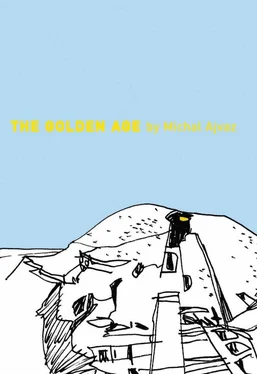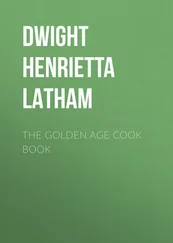Michal Ajvaz - The Golden Age
Здесь есть возможность читать онлайн «Michal Ajvaz - The Golden Age» весь текст электронной книги совершенно бесплатно (целиком полную версию без сокращений). В некоторых случаях можно слушать аудио, скачать через торрент в формате fb2 и присутствует краткое содержание. Год выпуска: 2010, Издательство: Dalkey Archive Press, Жанр: Современная проза, на английском языке. Описание произведения, (предисловие) а так же отзывы посетителей доступны на портале библиотеки ЛибКат.
- Название:The Golden Age
- Автор:
- Издательство:Dalkey Archive Press
- Жанр:
- Год:2010
- ISBN:нет данных
- Рейтинг книги:4 / 5. Голосов: 1
-
Избранное:Добавить в избранное
- Отзывы:
-
Ваша оценка:
- 80
- 1
- 2
- 3
- 4
- 5
The Golden Age: краткое содержание, описание и аннотация
Предлагаем к чтению аннотацию, описание, краткое содержание или предисловие (зависит от того, что написал сам автор книги «The Golden Age»). Если вы не нашли необходимую информацию о книге — напишите в комментариях, мы постараемся отыскать её.
is Michal Ajvaz’s greatest and most ambitious work.
The Golden Age
The Golden Age — читать онлайн бесплатно полную книгу (весь текст) целиком
Ниже представлен текст книги, разбитый по страницам. Система сохранения места последней прочитанной страницы, позволяет с удобством читать онлайн бесплатно книгу «The Golden Age», без необходимости каждый раз заново искать на чём Вы остановились. Поставьте закладку, и сможете в любой момент перейти на страницу, на которой закончили чтение.
Интервал:
Закладка:
Michal Ajvaz
The Golden Age
Without doubt, metaphysics has to do with everything that exists. However, the totality of what exists, including what has existed and will exist, is infinitely small in comparison with the totality of the Objects of knowledge. This fact easily goes unnoticed, probably because the lively interest in reality which is part of our nature tends to favor that exaggeration which finds the non-real a mere nothing — or, more precisely, which finds the non-real to be something for which science has no application at all or at least no application of any worth. […] There is not the slightest doubt that what is supposed to be the Object of knowledge need not exist at all.
Alexius Meinong, The Theory of ObjectsAnd they are each other than one another, as being plural and not singular; for if one is not, they cannot be singular but every particle of them is infinite in number; and even if a person takes that which appears to be the smallest fraction, this, which seemed one, in a moment evanesces into many, as in a dream, and from being the smallest becomes very great, in comparison with the fractions into which it is split up.
Plato, ParmenidesThe whole thing looks senseless enough, but in its own way perfectly finished.
Franz Kafka, “The Cares of a Family Man”The second journey
Whenever I told my friends about the island in the Atlantic Ocean where in my travelling days I spent almost three years, it often happened that one of them would ask me to submit a written report on this little-known island which is known to its inhabitants by no name and which travellers through the ages gave a name according to superficial impressions, moods of nostalgia and the need to flatter the families of their rulers. I would be vexed by the thought of writing of a society whose mores and pleasures I barely understood even when I was living among them (although I succeeded during my stay in catching every sickness of its spirit). It seemed to me more agreeable and more considerate to this place to accord it the fate of other landscapes I passed through, simply to look on contentedly as its contours gradually dissolved in a haze created by a mix of memory, forgetting, and dream, a radiant mist which softens shapes, leaving phantoms of sense to wander among them, and soaks them with the breath of a conciliation which perhaps has its basis in fallacy and the long useless. I thought it perfectly appropriate for the island to live on only in the form of nameless echoes which are stirred in gestures, muted tones resonating in the meaning of words and utterances, phantom-like faces which flit past in the contours of things perceived, when the fluttering of time unlooses memories and their liquid quintessence seeps into the landscape of the present.
That I have now undertaken to make a second journey to the island is not because I have begun to feel regret that the memories of my last visit will soon dissolve. (Images must die so that they may help make new images and feats.) The taste and the courage for a new journey were born of other reasons. Only now, when the images are at last being swallowed by the confused jungle of the past, when they are almost entirely lost to the rainforest of the past which covers the greatest part of the territory of our consciousness, only now am I drawn to embark on a journey which promises to be as adventurous as a voyage across the seas, en route to the exotic lands of the past, to the tropics of memory of forgetting, where flashes of reality mingle with dreams and visions, images with the rhythms and whirls of forces, crumbling words with the unremitting hum of the consciousness and the tenacious glare of erstwhile gemstones and the painfully dazzling rays of an inner sun.
The aim of this expedition is not the conquering of images, nor the salvation of distorted shapes, nor the discovery of an order or a sense of the real. These wanderings have a purpose in and of themselves. Whatever aim this journey has consists in its futility. The aim of my return to the island is merely my private joy at a pointless resurrection, a parody of passion in which the dissolving phantoms of memory come back to life as the even less real and spookier ghosts of language, joy and comedy, in which the ever-more elaborate maze of the past turns into a similarly elaborate and impenetrable maze of sentences, in which the questionable joys of language feed on the untrustworthy pleasures of memory and forgetting. Welcome to the show, dear reader. It is possible that some will think the celebration of the pleasurable rituals of futility the realm of less dignified literature; I would like to remind such readers that there are many books replete with wise thoughts and deep psychological insight which will no doubt satisfy their needs, and that there is no reason why they should read a travel book about an island unknown to them and its strange inhabitants.
The islanders would understand this; and I would surely not undertake such a journey if during my long stay on the island I had not become infected with the islanders’ way of perceiving the world. On the island meaningfulness was taken as something base, almost indecent, and the islanders saw a great many shades of pleasure in the meaningless. So while others use words to build complex structures of meaning, I wish to devote myself to the joyful histories in which the maze of the island’s life, which is without order and has no centre, is first transformed into the still more fantastic ruins of memory reminiscent of the sleeping Leviathan before it is overgrown with the jungle of language so completely that it disappears into it. I must admit that I am also driven to write by regret, by nostalgia, and the silent hope that as the sentences meander the smells of the island — from which once I had allowed one ship after another to leave without me — will waft in my direction, at least for a while. For the very reason that words do not always attend to our wishes, coming to us uninvited, serving to confuse us, out of landscapes unknown, for a moment their light can shine on lost treasures, treasures hidden from the memory.
When I confided in some of my friends my intention to write about the island after all, I was given various advice. There were those who advised me not to succumb to the prejudices of the society in which I live or to my own sympathies or animosities; I should keep a cool distance from my material. This is unproblematic for me, as I neither loved the inhabitants of the island nor did I loathe them (although there were times when I admired them and times when I felt for them contempt and perhaps even hatred). The islanders never did anything to harm me, but when I left none of them were particularly sad to see me go. I am not sure if my indifference — which is a product of my stay on the island, incidentally — will allow me to keep the scientific distance of the ethnologist, but at least it is a guarantee that I will treat even-handedly a people among whom I lived for three years and in whose language my dreams still speak.
It will be more problematic for me not to disappoint the hope of some that what I have to tell of the island will be enthralling. For certain life on the island was different in many ways from our life, but it would be difficult to find in its features any richness of colour or picturesqueness. The island was not adorned with any examples of natural beauty or historical monuments; it had no stories that boasted of glory or fame; there were no gaily-coloured festivals or folk costumes to charm the visitor, nor was there fineness in the ways or peculiarity in the character of the islanders. We might indeed describe life on the island as exotic, but this was an exoticism of elaborate ornament and oriental music that captivate at first by their unfamiliar shapes and sounds but after a while induce boredom, as they offer no instructions for their rendering in the language of our shapes and the language of our sounds. And I will disappoint those who enjoy reading tales of the adventures of travellers in distant lands: for several hundred years, since the time conquerors from Europe disembarked on its shores, nothing of note has happened on the island. It was one of the safest places on earth, but — for those with no appreciation of the strange pleasures of the islanders — also one of the most boring.
Читать дальшеИнтервал:
Закладка:
Похожие книги на «The Golden Age»
Представляем Вашему вниманию похожие книги на «The Golden Age» списком для выбора. Мы отобрали схожую по названию и смыслу литературу в надежде предоставить читателям больше вариантов отыскать новые, интересные, ещё непрочитанные произведения.
Обсуждение, отзывы о книге «The Golden Age» и просто собственные мнения читателей. Оставьте ваши комментарии, напишите, что Вы думаете о произведении, его смысле или главных героях. Укажите что конкретно понравилось, а что нет, и почему Вы так считаете.












